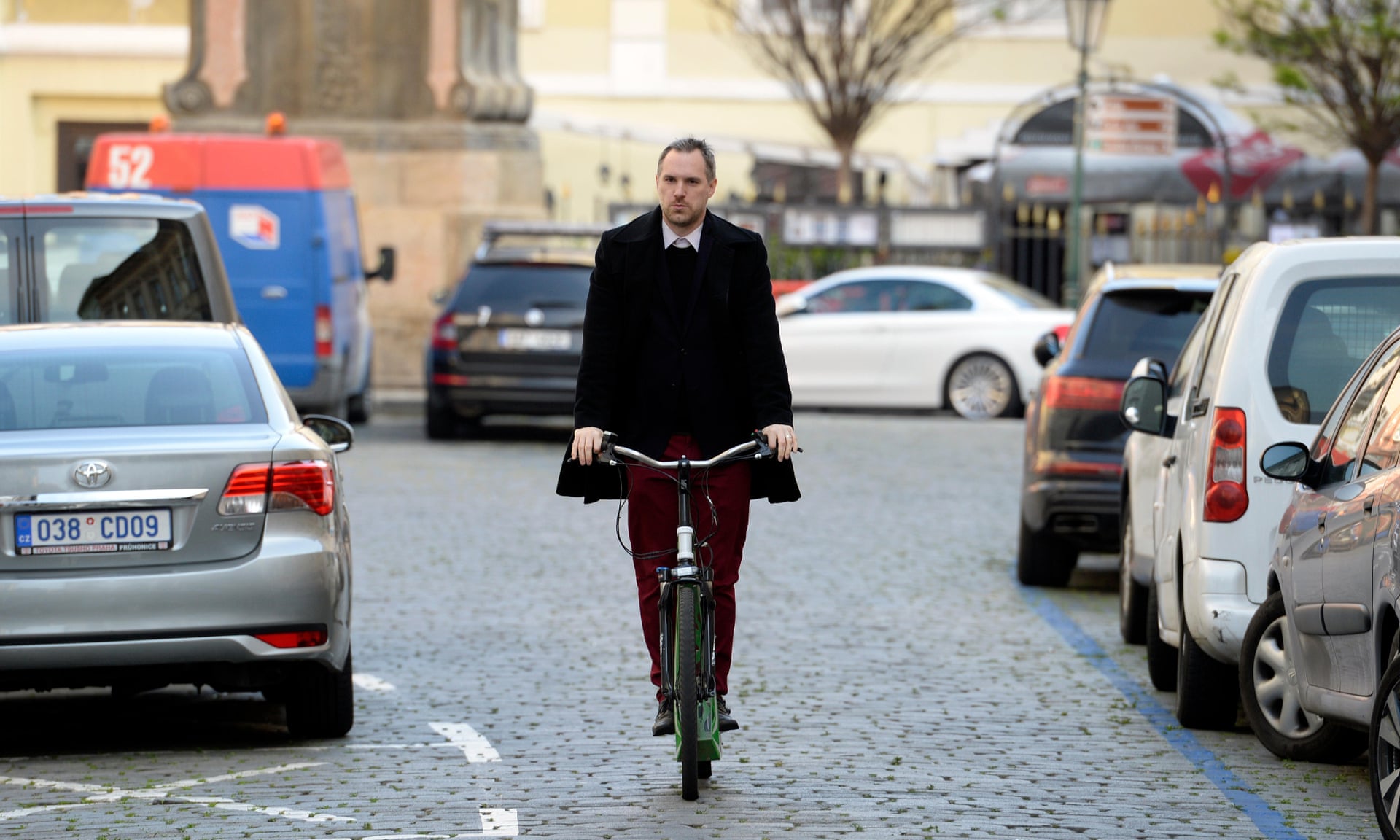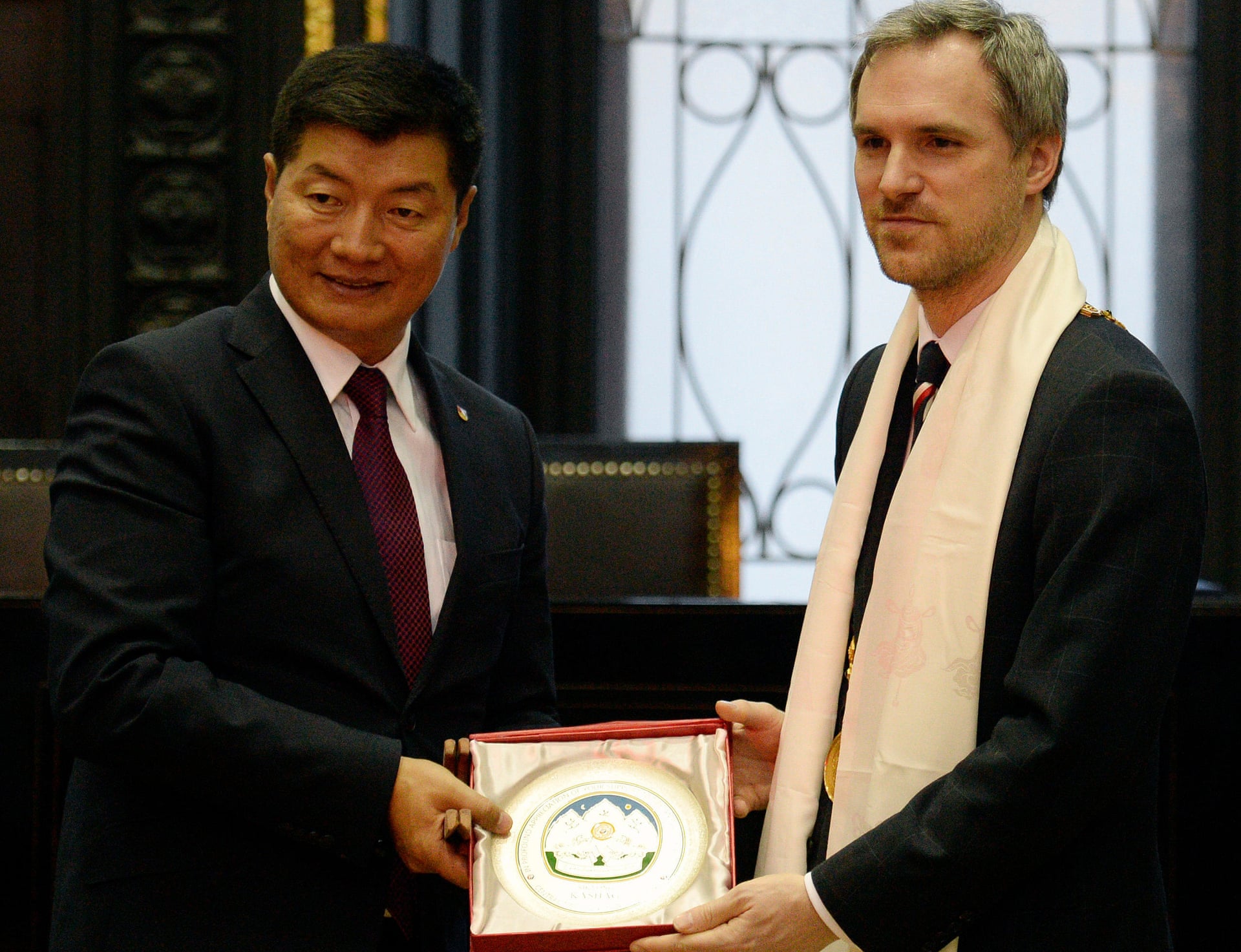Prague security services say China poses major threat as Czech billionaire's loan firm launches propaganda campaign to burnish Beijing’s image
By Robert Tait
Liberal Prague mayor Zdeněk Hřib, who refused to abide by Beijing’s One China policy, which recognises China’s claim to Taiwan.
The Czech Republic’s richest man is at the centre of a foreign influence campaign by the Chinese government after one of his businesses financed an attempt to boost China’s image in the central European country.
In a development that has taken even seasoned sinologists aback, Home Credit – a domestic loans company owned by Petr Kellner that has lent an estimated £10bn to Chinese consumers – paid a PR firm to place articles in the local media giving a more positive picture of a country widely associated with political repression and human rights abuses.
Home Credit also funded a newly formed thinktank – headed by a translator for the Czech Republic’s pro-Chinese president, Miloš Zeman – to counteract the more sceptical line taken by a longer-established China-watching body, Sinopsis, linked with Prague’s Charles University, one of Europe’s oldest seats of learning.
Experts say the moves, revealed in an investigation by the Czech news site Aktualne, bear the hallmarks of a foreign influence campaign by China that highlights its aggressive attempts to gain access to former communist central and eastern European countries through its ambitious “belt and road” initiative, under which it offers to fund infrastructure projects in those states.
According to analysts, the Czech Republic has been more open to Chinese influence than most other European countries, a situation that has coincided with the burgeoning commercial relationship between China and Kellner’s sprawling PPF group, which boasts an estimated £40bn in assets, including Home Credit.
PPF began accumulating its vast wealth in the mass privatisation of state assets that followed the fall of communism in the former Czechoslovakia in 1989.
Home Credit is currying favour with the Chinese regime in an effort to protect its interests after a series of political disputes between China and the Czechs that cooled previously warm bilateral relations.
Home Credit has acknowledged paying the PR firm, C&B Reputation Management, and backing Sinoskop, the thinktank, to try to bring “greater balance” to debate about China.
“Discussion of China in the Czech Republic had become one-sided, relentlessly negative and poorly informed,” Home Credit’s spokesman, Milan Tomanek, told the Observer.
Martin Hala, a lecturer at Charles University’s Sinology department and director of Sinopsis, said: “The bottom line is that Home Credit hired this company not to defend their own corporate interests per se, but rather to promote the narrative coming from the People’s Republic of China and the Chinese communist party.
“The first goal is to normalise China, presenting it not as a dictatorship but as a country, like any other, that is opening up to reforms. I don’t think that’s an accurate picture.”
The revelations coincide with a recent warning by the Czech intelligence service, BIS, that Chinese influence campaigns pose a greater threat to national security than meddling by the Russian government of Vladimir Putin.
“The BIS considers primarily the increase in the activities of Chinese intelligence officers as the fundamental security problem,” the report says.
“These activities can be clearly assessed as searching for and contacting potential cooperators and agents among Czech citizens.”
Czech ties with Beijing grew closer after 2014 when the regime granted Home Credit a nationwide licence to offer domestic loans, the first foreign company to be given the right.
This would only have happened on the understanding that Home Credit would work to ensure favourable coverage of China in the Czech media and political discourse.
It heralded several trips to China by Zeman, who is close to Kellner, and culminated in a state visit in 2016 by the Chinese dictator Xi Jinping to Prague.
The rapprochement – which also saw the purchase of a Czech brewery, television station and Slavia Prague football club by a Chinese energy company, CEFC – reversed the policy adopted by the late Václav Havel, the Czech Republic’s first post-communist president who had championed human rights, and the Dalai Lama, the exiled spiritual leader of Tibet.
But relations began to sour last year when the Czech government of prime minister Andrej Babiš, acting on advice from the country’s cybersecurity agency, banned Huawei phones from ministerial buildings, prompting Chinese protests and a rebuke from Zeman, who accused the security services of “dirty tricks”.
They took a further turn for the worse when Prague’s liberal mayor, Zdeněk Hřib, refused to abide by the One China policy – recognising China’s territorial claim to Taiwan – accepted by his predecessor as part of a twinning arrangement between the Czech capital and Beijing.
In retaliation, China scrapped the agreement and cancelled a planned tour of the country by the Prague Philharmonia.
Amid the rows, criticism began to appear in Chinese state media of Home Credit’s lending practices, accompanied by several failures in court to fully recover unpaid debts.
That has fuelled speculation that the company began to fear for the future of its interests in China.
When Sinopsis reported the Chinese media criticism on its website, it received a “cease and desist” legal warning from Home Credit which threatened to sue unless in the absence of an apology.
The company accuses Sinopsis of failing to correct “misleading or incorrect statements”.
Home Credit had earlier abandoned a £50,000 sponsorship deal with Charles University – which foreswore each institution from damaging the other’s good name – after a backlash from academics, who feared it would muzzle any criticism of China.
Now critics see a new threat, from PPF’s recent £1.62bn purchase from AT&T of Central European Media Enterprises (CME), a company which includes the Czech Republic’s most-watched commercial TV station, Nova, as well as channels in neighbouring countries.
PPF has dismissed warnings about potential political interference in the station’s output but some are sceptical.
“PPF negotiated this deal saying that they would never meddle in politics,” said Petr Kutilek, a Czech political analyst and human rights activist.
“But from the Home Credit affair, you actually see them meddling in politics.”
Affichage des articles dont le libellé est Zdeněk Hřib. Afficher tous les articles
Affichage des articles dont le libellé est Zdeněk Hřib. Afficher tous les articles
lundi 6 janvier 2020
mercredi 3 juillet 2019
Zdeněk Hřib: the Czech mayor who defied China
By refusing to expel a Taiwanese diplomat, the Prague mayor has joined the ranks of local politicians confronting contentious national policies
By Robert Tait in Prague
Zdeněk Hřib of the Czech Republic’s Pirate party.
Zdeněk Hřib had been Prague’s mayor for little more than a month when he came face-to-face with the Czech capital’s complex entanglement with China.
Hosting a meeting with foreign diplomats in the city, Hřib was asked by the Chinese ambassador to expel their Taiwanese counterpart from the gathering in deference to Beijing’s ‘one China’ policy, under which it claims sovereignty over the officially independent state of Taiwan.
Given recent Chinese investments in the Czech Republic, which have included the acquisition of Slavia Prague football club, a major brewery and a stake in a private TV station, the fledgling mayor could have easily agreed.
Prague city council had, under the preceding mayor, signed a twin cities agreement with Beijing that explicitly recognised the one China policy.
Instead, Hřib refused and the Taiwanese diplomat stayed.
The episode is a rare case of a local politician defying the might of a global superpower while making a principled stand against a national government policy that has promoted Chinese ties.
Instead, Hřib refused and the Taiwanese diplomat stayed.
The episode is a rare case of a local politician defying the might of a global superpower while making a principled stand against a national government policy that has promoted Chinese ties.
Hřib has since gone further, demanding Beijing officials drop the clause stating Prague’s support for the one China policy in the 2016 deal and threatening to scrap the arrangement if they refuse.
“This article is a one-sided declaration that Prague agrees with and respects the one China policy and such a statement has no place in the sister cities agreement,” Hřib said in an interview in Prague’s new town hall, close to the city’s historic tourist district, which draws an increasing number of visitors from China.
“The one China policy is a complicated matter of foreign politics between two countries. But we are solving our sister cities relationship on the level of two capital cities.”
“This article is a one-sided declaration that Prague agrees with and respects the one China policy and such a statement has no place in the sister cities agreement,” Hřib said in an interview in Prague’s new town hall, close to the city’s historic tourist district, which draws an increasing number of visitors from China.
“The one China policy is a complicated matter of foreign politics between two countries. But we are solving our sister cities relationship on the level of two capital cities.”
Hřib, a 38-year-old doctor who spent a medical training internship in Taiwan, is challenging the Czech president, Miloš Zeman, who has visited China several times, installed a Chinese adviser at his office in Prague castle and declared that he wanted to learn “how to stabilise society” from the country’s communist rulers.
The dispute has catapulted the unassuming Hřib to household name status in Czech politics, helped by Prague’s position as an international cultural draw and its outsize share of national resources.
Hřib’s rise from obscurity is striking because Czech mayors, unlike their US and Polish counterparts, are not directly elected.
The dispute has catapulted the unassuming Hřib to household name status in Czech politics, helped by Prague’s position as an international cultural draw and its outsize share of national resources.
Hřib’s rise from obscurity is striking because Czech mayors, unlike their US and Polish counterparts, are not directly elected.
He became mayor of a coalition administration after his Pirate party, a liberal group with roots in civil society, finished second in last October’s municipal elections.
He says he is merely adopting the policy of his party and its two coalition partners in taking decisions that are cooling Prague’s relations with Beijing.
He says he is merely adopting the policy of his party and its two coalition partners in taking decisions that are cooling Prague’s relations with Beijing.
Zdeněk Hřib and Lobsang Sangay at the Old Town Hall in Prague.
In March, his administration restored the practice of flying the Tibetan flag from Prague’s town hall, reinstating a tradition begun in the era of the Czech Republic’s first post-communist president, Václav Havel, that was dropped by the previous city administration.
At the same time, in a move tailor-made to infuriate Beijing, Hřib hosted the visiting head of Tibet’s government-in-exile, Lobsang Sangay.
An official visit to the Taiwanese capital, Taipei, followed.
An official visit to the Taiwanese capital, Taipei, followed.
During the visit, Hřib criticised China for harvesting organs from political prisoners belonging to the Falun Gong movement.
Threats of retaliation came soon afterwards.
Threats of retaliation came soon afterwards.
A planned tour of China by the Prague Philharmonia in September is in jeopardy after it rebuffed Beijing’s demands to repudiate the mayor.
Iva Nevoralova, the orchestra’s spokesperson, likened the request to the actions of Czechoslovakia’s former communist regime, which pressured artists to denounce Havel’s dissident Charter 77 movement as the price for being allowed to perform.
Iva Nevoralova, the orchestra’s spokesperson, likened the request to the actions of Czechoslovakia’s former communist regime, which pressured artists to denounce Havel’s dissident Charter 77 movement as the price for being allowed to perform.
Members of the Prague Philharmonia.
Speaking to the Guardian, Hřib questioned whether Prague’s arrangement with Beijing was a fair relationship and criticised China’s “social scoring” system for good citizenship.
Speaking to the Guardian, Hřib questioned whether Prague’s arrangement with Beijing was a fair relationship and criticised China’s “social scoring” system for good citizenship.
He suggested that investment from Taiwan, with its western-style democracy and record of technological innovation, offered greater benefit.
The mayor has won praise for restoring the Czech Republic’s image as a champion of human rights and self-determination at a time when its politics have been dominated by the populist messages of Zeman and Andrej Babiš, the anti-immigration billionaire prime minister.
“It is empowering to see that a mayor of Prague can have a principled position, despite large portions of the Czech political establishment being co-opted by the narratives spread by the totalitarian government of China,” said Jakub Janda, executive director of the European Values thinktank, which monitors anti-western influence in Czech politics and beyond.

Jakub Janda@_JakubJanda
THREAD:
CZECH RESISTANCE TO CHINESE HARASSMENT:
We have a good Mayor of Prague. He supports Tibet + Taiwan. When the PRC ambassador tried to force him to have a TW diplomat kicked out of a diplomatic meeting hosted by Prague City Council, he declined.
2,268
8:59 PM - Apr 28, 2019
Jiří Pehe, the director of New York University in Prague, said Hřib was using the mayor’s office to reassert the values of Havel, who died in 2011.
The mayor has won praise for restoring the Czech Republic’s image as a champion of human rights and self-determination at a time when its politics have been dominated by the populist messages of Zeman and Andrej Babiš, the anti-immigration billionaire prime minister.
“It is empowering to see that a mayor of Prague can have a principled position, despite large portions of the Czech political establishment being co-opted by the narratives spread by the totalitarian government of China,” said Jakub Janda, executive director of the European Values thinktank, which monitors anti-western influence in Czech politics and beyond.

Jakub Janda@_JakubJanda
THREAD:
CZECH RESISTANCE TO CHINESE HARASSMENT:
We have a good Mayor of Prague. He supports Tibet + Taiwan. When the PRC ambassador tried to force him to have a TW diplomat kicked out of a diplomatic meeting hosted by Prague City Council, he declined.
2,268
8:59 PM - Apr 28, 2019
Jiří Pehe, the director of New York University in Prague, said Hřib was using the mayor’s office to reassert the values of Havel, who died in 2011.
“Everyone in this country knows that when you support Taiwan and Tibet, you’re saying exactly what Havel used to say,” said Pehe.
“This was intentional on the part of the Pirate party as soon as he took over Prague. They are saying that the Czech Republic has a special history of fighting against communism and you should respect it.”
Inscription à :
Articles (Atom)


